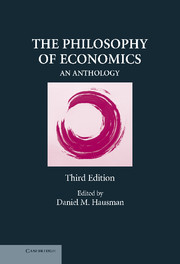Book contents
- Frontmatter
- Contents
- Introduction
- PART ONE CLASSIC DISCUSSIONS
- PART TWO POSITIVIST AND POPPERIAN VIEWS
- PART THREE IDEOLOGY AND NORMATIVE ECONOMICS
- PART FOUR BRANCHES AND SCHOOLS OF ECONOMICS AND THEIR METHODOLOGICAL PROBLEMS
- 16 Econometrics as Observation: The Lucas Critique and the Nature of Econometric Inference
- 17 Does Macroeconomics Need Microfoundations?
- 18 Economics in the Laboratory
- 19 Neuroeconomics: Using Neuroscience to Make Economic Predictions
- 20 The Market as a Creative Process
- 21 What Is the Essence of Institutional Economics?
- PART FIVE NEW DIRECTIONS IN ECONOMIC METHODOLOGY
- Selected Bibliography of Books on Economic Methodology
- Index
- References
16 - Econometrics as Observation: The Lucas Critique and the Nature of Econometric Inference
Published online by Cambridge University Press: 05 June 2012
- Frontmatter
- Contents
- Introduction
- PART ONE CLASSIC DISCUSSIONS
- PART TWO POSITIVIST AND POPPERIAN VIEWS
- PART THREE IDEOLOGY AND NORMATIVE ECONOMICS
- PART FOUR BRANCHES AND SCHOOLS OF ECONOMICS AND THEIR METHODOLOGICAL PROBLEMS
- 16 Econometrics as Observation: The Lucas Critique and the Nature of Econometric Inference
- 17 Does Macroeconomics Need Microfoundations?
- 18 Economics in the Laboratory
- 19 Neuroeconomics: Using Neuroscience to Make Economic Predictions
- 20 The Market as a Creative Process
- 21 What Is the Essence of Institutional Economics?
- PART FIVE NEW DIRECTIONS IN ECONOMIC METHODOLOGY
- Selected Bibliography of Books on Economic Methodology
- Index
- References
Summary
Kevin Hoover (1955–) received a D.Phil. in economics from Oxford University after an undergraduate major in philosophy, and his work reflects this dual competence. He has contributed both to contemporary economics (especially macroeconomics) and to economic methodology, serving for a decade as the editor of The Journal of Economic Methodology. After more than two decades at the University of California, Davis, Hoover is now a professor of economics and a professor of philosophy at Duke University.
The Lucas Critique
Perhaps the principal challenge to the use of econometric models in economic analysis is the policy non-invariance argument, popularly known as the ‘Lucas critique’. Robert Lucas (1976) attacks the use of econometric models as bases for the evaluation of policy on the grounds that the estimated equations of such models are unlikely to remain invariant to the very changes in policy that the economist seeks to evaluate. The argument is originally cast as an implication of rational expectations. Among the constraints people face are the policy rules of the government. If people are rational, then, when these rules change, and if the change is correctly perceived, they take proper account of the change in adjusting their behavior. The rational expectations hypothesis implies that changes in policy will in fact be correctly perceived up to a serially uncorrelated error.
- Type
- Chapter
- Information
- The Philosophy of EconomicsAn Anthology, pp. 297 - 314Publisher: Cambridge University PressPrint publication year: 2007



